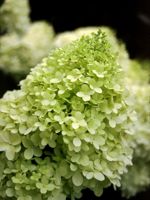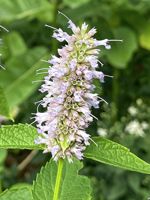Mon-Fri 9am - 5pm Mountain time
Limelight Hydrangea vs Anise Hyssop
Hydrangea paniculata Limelight
Agastache foeniculum
NOT AVAILABLE THIS SEASON - MIGHT RETURN
NOT AVAILABLE THIS SEASON - MIGHT RETURN
Limelight Hydrangea is a flowering shrub that is known for its green flowers. As they mature, the flower colour changes from a pale green to a creamy white, followed by shades of pink and red. Hydrangea flowers persist longer compared to other flowering shrubs, blooming from late July into fall. They are a popular choice for flower arrangements.
The Limelight Hydrangea can be grown as a stand alone shrub, as a hedge, or incorporated into a flower garden. Blooms occur on new wood, so regular pruning is encouraged in late winter. This is an award winner from the Proven Winners® collection.
Anise Hyssop is a native perennial wildflower known for its fragrant spikes of small purple flowers. This plant is an excellent source of nectar and is highly attractive to a variety of bees and other pollinators. Deadheading spent flowers will encourage more blooms throughout the season.
Its aromatic leaves release an anise-like (licorice) scent when crushed. Both the leaves and seeds are edible and have been used in teas and as flavouring. Leaves can be harvested at any time, though the oil content is highest just past full bloom. Deer tend to avoid Anise Hyssop because of its strong-smelling leaves. This makes it a useful plant for positioning as a protective border around more vulnerable species.
Anise Hyssop spreads by seeds and rhizomes, but is less aggressive than other members of the mint family and is easy to remove if needed. Historically, it was planted in large numbers as a honey plant to support apiaries. Birds also feed on its seeds, adding to its ecological value.
Limelight Hydrangea Quick Facts
Anise Hyssop Quick Facts
Toxicity: toxic to dogs, cats, and horses

